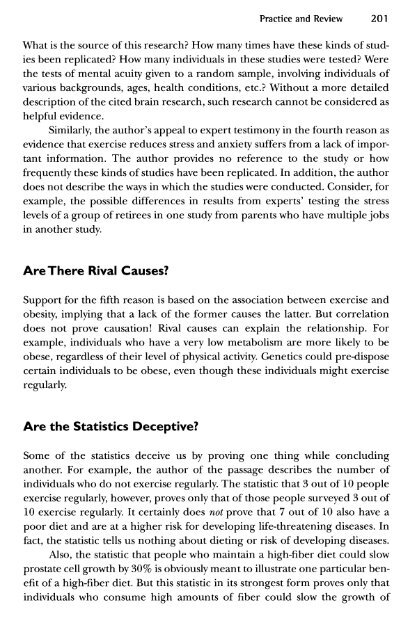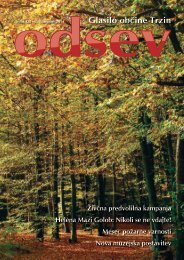Asking the Right Questions, A Guide to Critical Thinking, 8th Ed
Asking the Right Questions, A Guide to Critical Thinking, 8th Ed
Asking the Right Questions, A Guide to Critical Thinking, 8th Ed
Create successful ePaper yourself
Turn your PDF publications into a flip-book with our unique Google optimized e-Paper software.
Pra cti ce an d Revi ew 201<br />
What is <strong>the</strong> source of this research? How many times have <strong>the</strong>se kinds of studies<br />
been replicated? How many individuals in <strong>the</strong>se studies were tested? Were<br />
<strong>the</strong> tests of mental acuity given <strong>to</strong> a random sample, involving individuals of<br />
various backgrounds, ages, health conditions, etc.? Without a more detailed<br />
description of <strong>the</strong> cited brain research, such research cannot be considered as<br />
helpful evidence.<br />
Similarly, <strong>the</strong> author's appeal <strong>to</strong> expert testimony in <strong>the</strong> fourth reason as<br />
evidence that exercise reduces stress and anxiety suffers from a lack of important<br />
information. The author provides no reference <strong>to</strong> <strong>the</strong> study or how<br />
frequently <strong>the</strong>se kinds of studies have been replicated. In addition, <strong>the</strong> author<br />
does not describe <strong>the</strong> ways in which <strong>the</strong> studies were conducted. Consider, for<br />
example, <strong>the</strong> possible differences in results from experts' testing <strong>the</strong> stress<br />
levels of a group of retirees in one study from parents who have multiple jobs<br />
in ano<strong>the</strong>r study.<br />
Are There Rival Causes?<br />
Support for <strong>the</strong> fifth reason is based on <strong>the</strong> association between exercise and<br />
obesity, implying that a lack of <strong>the</strong> former causes <strong>the</strong> latter. But correlation<br />
does not prove causation! Rival causes can explain <strong>the</strong> relationship. For<br />
example, individuals who have a very low metabolism are more likely <strong>to</strong> be<br />
obese, regardless of <strong>the</strong>ir level of physical activity. Genetics could pre-dispose<br />
certain individuals <strong>to</strong> be obese, even though <strong>the</strong>se individuals might exercise<br />
regularly.<br />
Are <strong>the</strong> Statistics Deceptive?<br />
Some of <strong>the</strong> statistics deceive us by proving one thing while concluding<br />
ano<strong>the</strong>r. For example, <strong>the</strong> author of <strong>the</strong> passage describes <strong>the</strong> number of<br />
individuals who do not exercise regularly. The statistic that 3 out of 10 people<br />
exercise regularly, however, proves only that of those people surveyed 3 out of<br />
10 exercise regularly. It certainly does not prove that 7 out of 10 also have a<br />
poor diet and are at a higher risk for developing life-threatening diseases. In<br />
fact, <strong>the</strong> statistic tells us nothing about dieting or risk of developing diseases.<br />
Also, <strong>the</strong> statistic that people who maintain a high-fiber diet could slow<br />
prostate cell growth by 30% is obviously meant <strong>to</strong> illustrate one particular benefit<br />
of a high-fiber diet. But this statistic in its strongest form proves only that<br />
individuals who consume high amounts of fiber could slow <strong>the</strong> growth of



